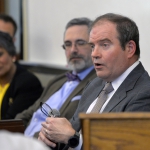
Elizabeth Lieberknecht of the Environmental Defense Fund (left to right), Isaac Brown of the Center for Methane Emissions Solutions, Aubrey Mascarenhas of Questor, Charles Sutcliffe of Governor’s Office of Coastal Activities, and LSU Law Professor Keith Hall take part in the “Cutting Waste, Creating Jobs & Taking Climate Action,” a panel discussion at LSU Law.
LSU Law and the John P. Laborde Energy Law Center hosted “Cutting Waste, Creating Jobs & Taking Climate Action,” a panel discussion on the importance of methane mitigation and responsible oil and gas development in Louisiana, on Wednesday, April 5, at the Paul M. Hebert Law Center.
Methane is the primary component in natural gas. When methane is emitted, it can have a detrimental effect on the environment and the economy. Methane is classified as a profound pollutant, and its emission is also considered product loss (resulting in revenue loss) to oil and gas operations.
The panel discussed how emerging technologies and solutions that address the prevention of methane waste from occurring and capturing any emissions to preserve the environment. LSU Law Professor Keith Hall, who also serves as director of the Laborde Energy Law Center, spoke on the impacts methane mitigation measure could have on severance and royalty taxes and leases.
Panelists also included:
- Isaac Brown, Executive Director, Center for Methane Emissions Solutions
- Elizabeth Lieberknecht, Regulatory and Legislative Manager, Midcontinent, Environmental Defense Fund
- Aubrey Mascarenhas, CEO, Questor
- Charles Sutcliffe, Chief Resilience Officer, Governor’s Office of Coastal Activities
“Methane emissions and efforts to minimize those emissions—called methane mitigation—raise important public policy and legal issues,” Professor Hall said. “Our understanding of these issues continues to evolve, and so does the technology that is available to control emissions. This is the exact sort of subject on which the Laborde Energy Law Center can facilitate productive exchanges of information between regulators, industry, the public, and nongovernmental organizations, as well as the lawyers who represent these groups and law students who will be representing them very soon. I am particularly delighted that many students were able to attend this program and learn how methane mitigation involves complex tradeoffs involving private contracts, economics, environmental concerns, and technology.”
Panelists discussed how 70% of current emissions can be addressed with technology today. Following the panel discussion, LSU Law students and members of the public were able to take part in a virtual reality simulation of methane mitigation technology.
Established in 2012, the LSU John P. Laborde Energy Law Center prepares lawyers to address the full range of 21st century issues in the complex energy sector and to assume leadership roles in industry, government, nonprofits, and the academy. The center is named for John P. Laborde (’49), a well-known New Orleans civic leader and leader of Louisiana’s energy sector, who made a historic $2 million gift to the Law Center to endow the program and to ensure its continuation for years to come.











